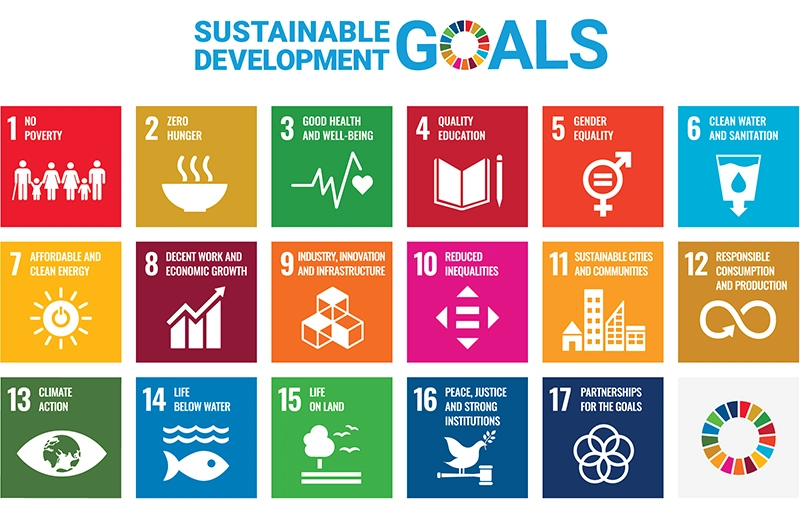Enhancement of work environment, leading to strengthening of human resources
Promote human resource development, diversity, and workstyle reforms that improve job satisfaction and foster a sense of personal growth
Tokyo Century continues to invest in the human resources who support its growth and to develop workplace environments in which all officers and employees feel empowered in their work. These undertakings will be imperative to ensuring that the Company can keeping growing and evolving in the current era of rapid change.
We conduct employee engagement surveys to help focus our efforts to develop workplace environments in which all employees respect one another and are able to fully exercise their talents. The results of these surveys are analyzed to identify issues and shape future initiatives, and this information is incorporated into officer training and discussed on an ongoing basis by the Management Meeting and the Board of Directors, so that identified issues can be addressed as top management priorities. Various measures for improving employee engagement have been implemented via this process. For example, we have introduced an hourly paid leave program and a teleworking system, along with the Career Challenge Program internal recruitment system, which is designed to provide employees with an opportunity to chart their own career courses. Surveys have also been used to facilitate the enhancement of work–life balance support systems for assisting employees giving birth, raising children, or providing care to family members. Tokyo Century has also launched TC-Mee+, an internal exchange forum aimed at enhancing communication among employees.

Moreover, the Diversity Promotion Office and the Career Design Office have been established within the Personnel Division to guide us in fostering a corporate culture in which diverse employees are able to proactively exercise their talents and individuality through efforts such as recruiting and developing diverse human resources and promoting diversity, equity, and inclusion. Moreover, we act in accordance with the Basic Diversity Policy by recruiting, developing, and promoting diverse human resources regardless of their race, religion, gender, age, sexual orientation, disability, or nationality. At the same time, diversity, equity, and inclusion training and educational programs targeting officers and employees are implemented with the goal of fostering a workplace environment built on mutual respect in which everyone is able to fully exercise their skills.
Defining 2023 as the first year of its full-fledged launch of well-being initiatives, Tokyo Century began broadcasting interviews with officers and employees and webinars on the themes of diversity, equity, and inclusion and diversity through its Tokyo Century NEWS owned media outlet as part of its proactive efforts to communicate information to external stakeholders.
Furthermore, Tokyo Century recognizes the health of officers and employees as an important management priority and has thus established its Basic Policy on Health and Productivity Management to outline its intent to increase its focus on the promotion of the health of its officers and employees. It is important to develop an environment in which all of our human resources-who represent our greatest assets-can work vigorously in good health, both physically and mentally, and fully exercise their individuality and all their abilities. We therefore strive to maintain and improve the well-being of our officers and employees and their families with the recognition that health and productivity management is a corporate management issue. In addition, coordination in said regard is pursued with industrial physicians, occupational health nurses, health insurance associations, and external experts to incorporate various health-related themes into e-learning programs targeting all officers and employees in order to foster health awareness.
In recognition of this diligence, Tokyo Century has been included in gender diversity-related indexes, such as the MSCI Japan Empowering Women (WIN) Select Index and Morningstar Japan ex-REIT Gender Diversity Tilt Index. The Company has been selected for inclusion in the 2025 Certified Health & Productivity Management Outstanding Organizations Recognition Program and was awarded a silver rating in the 2023 PRIDE INDEX.
- Contribution to the SDGs
-

Opportunities
- Recruitment of diverse human resources
- Invigoration of human resources through increased employee engagement
Risks
- Loss of talented human resources
- Inability to secure talented human resources due to unappealing workplace environment
- Failure to innovate
Goals and Progress
Scrollable horizontally
| KPI | Unit | Target year | Target | Target employees |
Fiscal 2021 | Fiscal 2022 | Fiscal 2023 |
|---|---|---|---|---|---|---|---|
| Annual paid leave acquisition rate | % | 2027 | Maintain rate of 70% or more |
|
75.6 | 78.8 | 81.1 |
| Childcare leave acquisition rate | % | 2027 | Maintain rate of childcare leave acquisition by male employees of 100% | Women | 100.0 | 100.0 | 100.0 |
| Men | 100.0 | 100.0 | 100.0 | ||||
| Ratio of employees with disabilities | % | 2027 | Maintain rate above legally mandated level |
|
3.22 | 2.86 | 3.40 |
| Ratio of women among new-graduate hires | % | 2027 | Maintain rate of 40% or more |
|
52.9 | 42.1 | 53.2 |
| Ratio of female managers among all managers | % | 2030 | 30% or more |
|
9.7 | 11.8 | 12.0 |
| Ratio of women in assistant manager position or equivalent | % |
|
|
|
48.1 | 49.6 | 51.8 |
| Gender-based wage disparity*1 | % |
|
|
All employees |
|
58.7 | 58.1 |
| Ratio of continuous employment after ten year by gender | % |
|
|
Women | 42.9 | 61.5 | 66.7 |
| Men | 58.3 | 65.4 | 56.0 | ||||
| Employee turnover rate | % |
|
|
Women | 0.9 | 0.9 | 1.0 |
| Men | 4.5 | 3.6 | 4.0 | ||||
| Number of people leaving work for nursing care reasons | People | 2027 | Maintain a nursing care turnover rate of zero |
|
0 | 0 | 0 |
| Rate of employees undergoing regular health check-ups | % | 2027 | 100% rate of employees undergoing regular health check-ups |
|
100.0 | 100.0 | 100.0 |
| Rate of employees undergoing stress checks | % | 2027 | 100% rate of employees undergoing stress checks |
|
98.6 | 100.0 | 100.0 |
| Ratio of employees receiving specific health guidance | % | 2027 | Ratio of employees receiving specific health guidance 80% or more | Officers and employees subject to specific health guidance over 40 years old | 81.7 | 80.4 | Under tabulation |
| Training expenses*2 | Millions of yen |
|
|
|
51.0 | 70.9 | 113.2 |
| Training expenses per employee*2 | Thousands of yen |
|
|
|
55 | 74 | 109 |
| Training hours per employee | Hours |
|
|
|
22.5 | 46.5 | 49.1 |
| Employees relocated through Career Challenge Program internal recruitment system | People |
|
|
|
13 | 18 | 19 |
| Employee engagement index | Deviation value | 2027 | Maintain and improve ratio of positive responses in employee engagement index | All employees (Excluding dispatched employees and individuals seconded from other companies) | *3 |
|
53.2*4 |
Note: KPIs, targets, and numerical results contained in this chart are for Tokyo Century on a non-consolidated basis.
- *1
Supplementary explanation regarding gender-based wage disparity
- There are no differences in the wage frameworks or systems between men and women.
- The Company sets different wage levels based on the career courses and qualifications of employees. There is a difference in the numbers of men and women in terms of the courses and qualifications, which creates a disparity in wage levels between genders.
- *2Figures for training expenses and training expenses per employee include venue rental expenses and transportation expenses.
- *3The engagement index has been measured using the Motivation Cloud service provided by Link and Motivation Inc. since fiscal 2023 and is represented as a deviation value from a nationwide average of 50. In fiscal 2021, a 63% rate of positive responses was received based on measurements in a survey conducted by a different company.
Initiative Example
In fiscal 2020, we introduced the Career Challenge Program, an internal recruitment system through which division and branches recruiting human resources disclose their requirements and appoint personnel from the applicants. An aggregate total of 64 employees have been assigned to their desired positions (as of April 2024).
In fiscal 2020, we introduced the TC Biz Challenge Project, a new business proposal initiative supporting employee efforts to tackle new challenges without fear of failure. Of the 36 applications received in the first round, unfortunately, an integrated aquaculture–agriculture cultivation facility project that passed the final screening did not lead to commercialization after proceeding with verification tests. However, moving forward, we will continue to take on new challenges.
In fiscal 2021, we formulated the Tokyo Century Group Human Rights Policy. We respect the human rights of all officers and employees and strive to create a vibrant, rewarding working environment where everyone’s human rights and human dignity are respected. Recognizing respect for human rights as a key issue, we will cultivate a corporate culture that allows diverse human resources to fully demonstrate their skills and individual characteristics and become a company in which all officers and employees can hone their expertise and experience growth and a sense of pride.
Tokyo Century received the Gold rating in the PRIDE Index 2024. The PRIDE Index was developed by “work with Pride,” a general incorporated association, to evaluate corporate initiatives for LGBTQ+ people, sexual minorities, in the workplace. This marks our third consecutive year receiving a PRIDE Index rating, following the Silver ratings in 2022 and 2023.
In fiscal 2021, we established the Policy on Health and Productivity Management, declaring that we would more sharply focus on improving the health of our officers and employees. It is important to develop an environment in which all of our human resources, who represent our greatest assets, can work vigorously in good health, both physically and mentally, and fully demonstrate their individuality and abilities. We therefore strive to maintain and improve the well-being of our officers and employees and their families with the recognition that health management is a corporate management issue.
Tokyo Century’s Contribution to the SDGs
Tokyo Century is contributing to the enrichment of daily life and the sustainable development of society toward achieving the SDGs adopted as a shared responsibility for the international community at the United Nations Summit on Sustainable Development.
